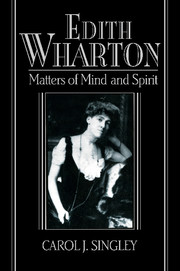Preface
Published online by Cambridge University Press: 06 August 2010
Summary
On se lasse de tout excepté de comprendre.
(One tires of everything except understanding.)
Edith Wharton, commonplace bookEdith Wharton wrote a total of twenty-five novels and novellas, including the Pulitzer Prize–winning The Age of Innocence; eighty-six short stories; three books of poetry; an autobiography; a book on the theory of fiction; eleven books or pamphlets of nonfiction; and scores of articles, reviews, and translations. At one point, her earnings from her writing exceeded those of any other living American writer. She continued to write until her death in 1937, collecting her ghost fiction in a volume the year she died and leaving another novel unfinished.
By any measure Edith Wharton's career was successful and her life full and adventurous. Yet expressions of longing appear throughout her letters and memoirs. Especially in the early years of her career, Wharton yearned for recognition from the New York aristocracy she so incisively portrayed in her stories and novels. Except for one cousin, however, her family and society treated her as an aberration, completely ignoring her literary achievements. Although Wharton later cultivated enduring, rewarding friendships with like-minded artists and intellectuals, she still voiced discontent. Cynthia Griffin Wolff detects a persistent tone of desolation and loneliness in her letters, noting that their most frequent refrain is “I have no one to talk to” (Feast 24). Wharton also desired better communication with her readers, wishing them to find deeper meanings in her fiction.
- Type
- Chapter
- Information
- Edith WhartonMatters of Mind and Spirit, pp. ix - xivPublisher: Cambridge University PressPrint publication year: 1995

